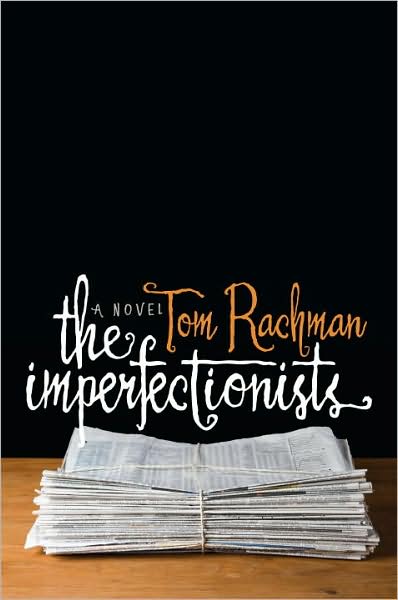Tuesday, February 15, 2011
Just Finished: A Comparison of Two Books
I recently read two books that had one basic similarity–each chapter focused on a different character and all the novel's characters were somehow intertwined. Books that shift from character to character require a delicate balance. They can be too short story-eque in which each character is too much a separate entity from all the others in the book. It can be too matchy-matchy in which all the characters are so kitsmetically intertwined that their lives crash into one crucial point. They can be so short story-esque and so focused on a particular moral or idea that neither of them end up being worth much or they can be well done with an evenhanded treatment of the characters, their relationship to each other, and the overall story arch.
Colum McCann's Let the Great World Spin and Tom Rachman's The Imperfectionists, in my opinion, are the good and the bad of character chapter books. I will say that both are well written and insightful however where McCann's novel is a hodge podge of half-told stories Rachman's book is a fairly smooth storyline composed of separate characters's stories that form a whole, compelling narrative.
In Let the Great World Spin, the characters are loosely united by a tightrope walker walking between the Twin Towers in NYC. More so, the characters are tied together by an era comprised of the Vietnam War, bohemian lifestyles, the emergence of computer technology, etc...While some of the characters do know each other, not all of them do and so the thin connection they have to New York City and the time period is just that...thin. One story is of an unconventional, young Irish monk who falls in love with a nurse and also tries to minister to the hookers who live work on the street in his drug infested neighborhood. Another is of an upper class woman who is falling apart after her son dies in the war and who tries to connect with other mothers, all less affluent than she, who have lost their sons in the war. Yet another is of some hackers in California who call a phone near the towers to find out if a man is really walking between them. Some characters are more compelling than others but at the end of the novel it becomes apparent that McCann was interested in presenting a time in U.S. history and the characters were just the vehicle for him to do that. I found that kind of disappointing and wish he would have done both...think he should have done both. It would have been worth the extra pages.
The Imperfectionists, on the other hand, is about the people who make a troubled international newspaper based in Rome. Some of the characters work for the paper, others read it, and others try to write for it. Each story deftly adds to the overall life of the paper and its story but it is also more of a backdrop to the actual characters that make or break it. The stories are unsentimental yet very human and evoking of empathy while also exploring the usual and unusual acts of people. In one story, a washed up freelance writer in Paris comes to grips with the mess he has made of his life while also learning something new about his son. In another, a would-be stringer trying to win a post in Egypt is entranced, perplexed, and extremely annoyed with a seasoned journalist he meets who seems to know everything and nothing. And in another story, an elderly woman reads each newspaper over the course of several days and therefore is still in the news of 1994 when she realizes that one day of the paper is missing. So, as you can gather, I greatly preferred this novel over the former one. Each story was a snippet of a character's life, yet it was still deeply connected to the overall story of the newspaper and best of all, didn't leave you hanging. I am still wondering what happened to the girl that the Irish monk was in love but I know where the elderly woman ends up with her backlog of newspapers.
I do realize that books do not, cannot, and should not all be wrapped up in a nice little package. (I would love that except for the triteness of it.) But I do think there is something to be said for telling a story--a full story--and Rachman does that well. There are great details throughout and each character is truly interesting and unique without being unreal. Quite a good showing for a first novel.
Labels:
Books
Subscribe to:
Post Comments (Atom)



No comments:
Post a Comment